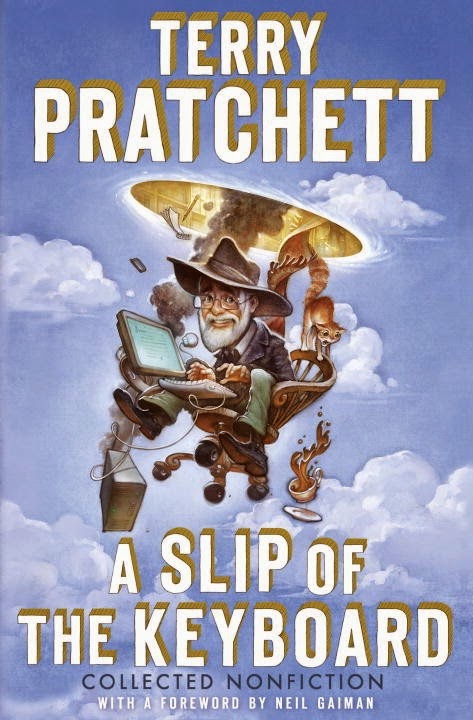Terry Pratchett has earned a place in the hearts of readers the world over with his bestselling Discworld series — but in recent years he has become equally well-known and respected as an outspoken campaigner for causes including Alzheimer's research and animal rights. A Slip of the Keyboard brings together for the first time the finest examples of Pratchett's non fiction writing, both serious and surreal: from musings on mushrooms to what it means to be a writer (and why banana daiquiris are so important); from memories of Granny Pratchett to speculation about Gandalf's love life, and passionate defences of the causes dear to him.The essays (and transcribed speeches) are arranged into three categories, divided up as sections. The order in which they appear seems to be roughly chronological — in subject matter rather than in original publication dates. Part one, titled "A Scribbling Intruder", mostly deals with things writing- and author-related. Here you will find amusing anecdotes about signing tours (and advice about signing tours), thoughts on fantasy — his own and others' — pieces in convention booklets, introductions to things and so forth. A most memorable essay was "No Worries", an amalgamation of the Australian signing tours Pratchett had done up until then. There was much hilarity.
With all the humour and humanity that have made his novels so enduringly popular, this collection brings Pratchett out from behind the scenes of the Discworld to speak for himself — man and boy, bibliophile and computer geek, champion of hats, orangutans and Dignity in Dying.
The second section, "A Twit and a Dreamer", is a more eclectic set of essays etc, as far as topic goes, anyway. There's one essay waxing lyrical about mushrooms and mushroom picking — "That Sounds Funghi, It Must Be the Dawn Chorus" — and another about his grandmother. There is also what I think is the oldest article, "Letter to Vector", written while Pratchett was still in school. And more introductions to things which, quite frankly, make me want to read the books they're introducing.
The final section is entitled "Days of Rage", which makes more sense if you've read the introduction to the collection, written by Neil Gaiman. (I don't often enjoy introductions, but this one was well worth it.) This last section deals with orangutans, the NHS, Alzheimer's and assisted dying. If you've been following Pratchett's progress at all, you'll be aware of his early-onset Alzheimer's (a rare variant that leaves him able to think perfectly well, but unable to type or do up his seatbelt). The last few essays are very much about Alzheimer's and his quest to legalise assisted-dying. It was interesting to read in more detail than I previously had about these issues (and reassuring in terms of wanting more Pratchett books, just saying).
So as not to end on a dark note, the collection does contain one more amusing essay: Terry Pratchett's footnotes to life.
I would not hesitate to recommend this book to Pratchett fans and also anyone interested in reading something autobiographical about him. Of course this is not a proper autobiography and skips many topics that a biography would usually cover, but it does reveal Pratchett's thoughts on many subjects and does sketch out aspects of his early life — mostly through anecdotes as part of speeches. It was a good book to dip into in not-too-large doses. I'm not sure I'd recommend reading it straight through as I found similar topics/ideas/anecdotes come up in a few essays which usually end up grouped together (since they are indeed on a similar topic). They were always presented in a different way, but could still come across as being slightly repetitive; one of the dangers of collecting previously published essays, I think.
4.5 / 5 stars
First published: September 2014, Doubleday
Series: No
Format read: eARC, US edition (the UK/Commonwealth cover is more sedate)
Source: Publisher via Edelweiss


No comments:
Post a Comment
Note: only a member of this blog may post a comment.